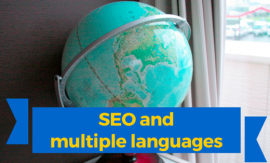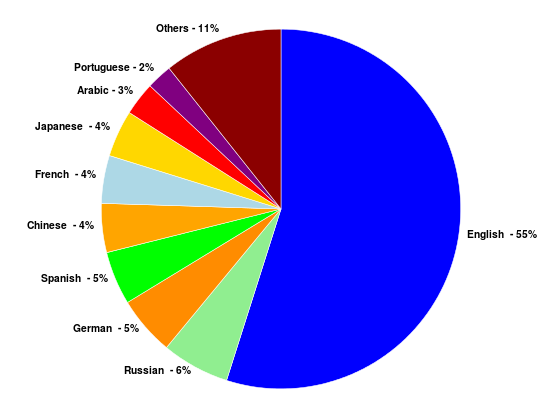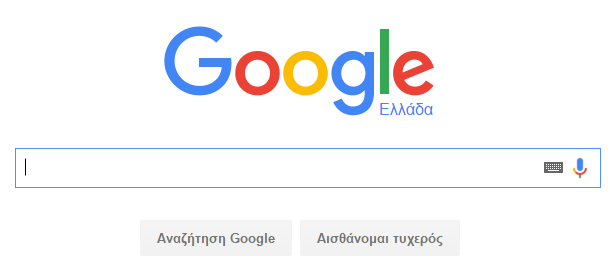
So you have your website, perhaps it is the online presence of your business; maybe it is your entire business. One thing is for sure however, you want people to visit your site, and then to take action on your site. If this was not true, then you probably would have not even bothered building the site in the first place. Every site owner eventually must ask themselves “Where do all of my visitors come from?”.
It may be worth stepping back, and considering how people are interacting with the internet itself; and what this may mean for your website. If you have a strong monolingual background, it may come as a surprise to you that the internet is not only in English. Here is a pie chart of internet users (people who use the internet) broken up by their first language (see Image 1).

1. Internet users by first language. Source: en.wikipedia.org/wiki/Internet
So we can see that just over a quarter of internet users have English as their first language. Things get a little out of proportion when we then look at websites broken down by what language they are written in (see Image 2). So even though English speakers account for just over one quarter of internet users, websites that are written in English account for over half of the current internet.
How does language affect people finding your site?
There are a few main ways in which someone finds a website, the two most prominent methods however are:
a) Search engines
b) Social media
Effect of language on search engine use
Google has over 160 registered domains, this is to cover a wide range of international product offerings for certain regions and languages. Google is attempting to ensure that you can use their service to search the internet in every language on the planet.

2. Websites by the language they are written in. Source: en.wikipedia.org/wiki/Internet
When a user enters their phrase into the Greek version of Google for example, the results will come back with a preference for pages that are written in Greek. As I am sure you are aware, there is a practice in which a website owner attempts to have their website listed higher on the results page of the search engines.
The practice is of course called Search Engine Optimization. Depending on how popular (or often how profitable) the keywords related to your website are, there can be some very fierce competition to get to that top position. There are millions of companies and freelancers that offer search engine optimization services, a huge portion of which are all attempting to gain traction for English-based search queries.
Having your website translated into numerous languages is perhaps one of the most underrated sources of ‘low hanging fruit’ out there. Generally the amount of work and tenacity required to get to the first position for an English search term is far greater than for a search term in a different language.
All it takes is a translation of your website to be on a subdomain or a subdirectory (note, you must not use multiple languages on the same website without separating by subdomain or subdirectory!) and your content can start ranking and drawing visitors from a wide range of languages.
Effect of language on social media
If you truly want to connect with potential clients, you are always best off doing it in their native languages. Even if you do not plan on sharing any of the non-English pages from your website onto your social media channels (as it may be confusing for your English-only speaking monolingual followers), there is still a great value in having the pages.
By using social media share icons on your translated pages you will encourage readers to then share the article amongst their friends, who will quite often speak the same language. You would also have the opportunity to create new social media profiles in the translated languages, and actually build up a base of followers for that language.

The Greek interface of Google
Offering your website in multiple languages can be a big step forward
The ability to reach a group of people who you previously couldn’t can be a great lift in your marketing efforts. Even more so if it is a group of people who are used to having to red everything in their second language; you may find they are very pleased to have their first language used as an option for them.
You will however need to ask yourself what level of language adaptation are you going to take, will you simply translate a few landing pages? Then warn any readers that if they decide they want to do business that they will have to be able to communicate in English anyway? If the page takes off and becomes popular, could hiring a sales person who is fluent in that language become a necessity in order to capitalize on the new found exposure?
You may be able to think of numerous ways that enacting your business in multiple languages may be problematic; however you should also remember that it is only problematic if you are bringing in new customers that you previously had no access to. Perhaps it would be a good problem to have?
Header image credit: tookapic
Header image edited with Canva
Author bio
Joshua Ballard operates Paradox Marketing, which is a Digital Marketing Agency in Adelaide, Australia.
When he isn’t joining in great discussions on growing internet trends and marketing practices he is on a continued quest for the perfect cup of coffee.








